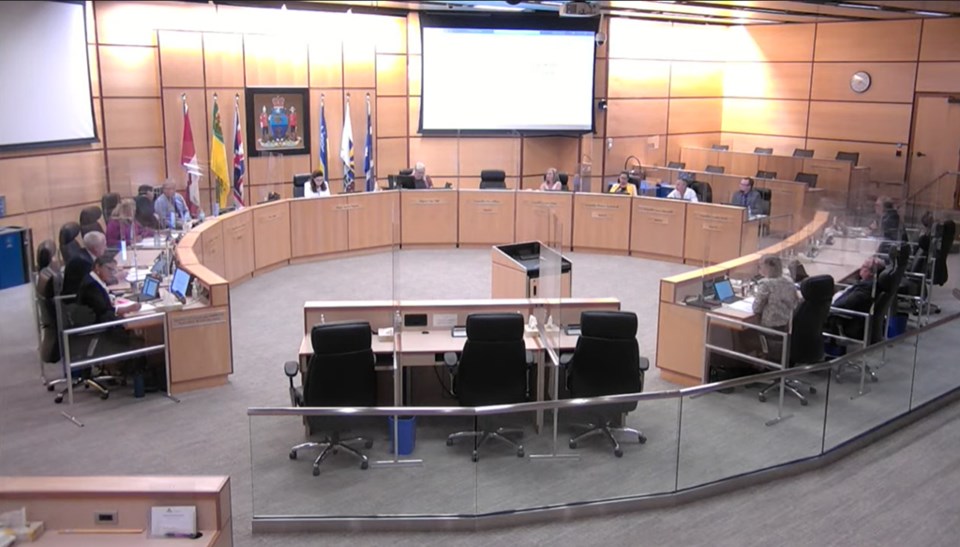REGINA — Regina city council returned to debating a city bylaw to ban conversion therapy on Wednesday, hearing from many public speakers during a meeting that lasted nearly seven hours.
Council first voted to introduce an amendment to the Prohibited Businesses Bylaw banning conversion therapy practices during its April executive meeting.
The return to the debate on Wednesday was for a second reading of the amendment, to discuss whether the language of the legislation was sufficient. A unanimous vote in favour was required to pass the bylaw at this time.
There were nearly 30 delegations on the docket who spoke on the topic during this meeting, a small number of whom were from outside Saskatchewan.
Council ultimately voted 9-1 in favour, with Ward 10 Councillor Landon Mohl opposed, meaning the bylaw will return for a third and final reading on Aug. 11.
Public debate during meeting talks bylaw language, necessity
Seventeen speakers expressed concerns with the bylaw amendment as it is written, and nine said they felt council should pass the legislation in its current form.
The majority of oppositional delegates said that their concerns stem from the language used in the bylaw, not the spirit of the bylaw itself.
Several said they were concerned the bylaw’s definition of “conversion therapy” was too broad and could limit the availability of too many types of counselling treatments, which would restrict individuals from getting help.
During council discussion, Mohl proposed the reinstatement of a previously removed exemption that would allow therapies for repressing sexual attraction for reasons other than a desire to be heterosexual or for addressing sexual addiction or maintaining celibacy.
Ward 4 Councillor Lori Bresciani also previously moved to reinstate this exemption earlier in the meeting.
Both motions were denied, on the grounds that other councillors felt the amendment may create a “loophole” for some conversion therapy practices to continue under different names.
“Anything that could create the opportunity for the ability to make people feel bad about themselves, I think needed to be removed from the equation,” said Mayor Sandra Masters during a meeting with media following council adjournment.
Masters also dismissed claims that the ban would limit individuals in seeking any kind of help regarding gender- or sexual-related concerns.
She noted that the bylaw would only apply to businesses or those receiving financial compensation for the provision of services, and not an individual’s ability to talk to family, friends or religious leaders on a personal level.
“That’s all completely within the realm of personal choice,” said Masters.
Other criticisms said that enacting a ban on specific therapies was not the duty of the municipality and should instead fall under federal jurisdiction, in reference to Bill C-6 which is currently set to be viewed by the Senate this September, provided there are no further delays.
Supporters of the bylaw expressed concern that relying on a ban at the federal level is not well-advised, as Bill C-6 may not have enough time to pass through a Senate vote if the expected federal election is called this fall.
Aspen Huggins, a representative from University of Regina Pride, said that even with federal legislation on the table, a municipal bylaw is still of importance to LGBTQ+ individuals in the community.
“Even if criminalization at a federal level comes to pass, there is still value to having a variety of tools at different levels to tackle this problem,” said Huggins, during discussion.
Masters echoed the statement in her remarks to the media following the meeting’s conclusion.
“We always say that at the municipal level of government, you are closest to the people,” said Masers. “I think it’s an important position for the city of Regina to take for the community. We want them to be safe and respected.”
August meeting: what comes next
Following adjournment, Mayor Sandra Masters confirmed that a unanimous council vote in August will not be necessary to put the bylaw banning conversion therapy practices into effect at that time.
“From what I have heard from the community, this bylaw is welcome,” said Masters. “The LGBTQ and Two-Spirit communities were looking for a position from the City of Regina relative to conversion therapy being banned, and we delivered that this evening.”
The final reading of the bylaw will not hear from any public delegates, and instead be discussed by council members only.
Masters said that she felt the progress made on the bylaw so far has been a positive step for the city, despite the controversy it has roused from some.
“This is just one of the things we can do to express our support and signal that we are looking to be more inclusive, and just like anything else, we need to continue to walk the walk,” said Masters.




